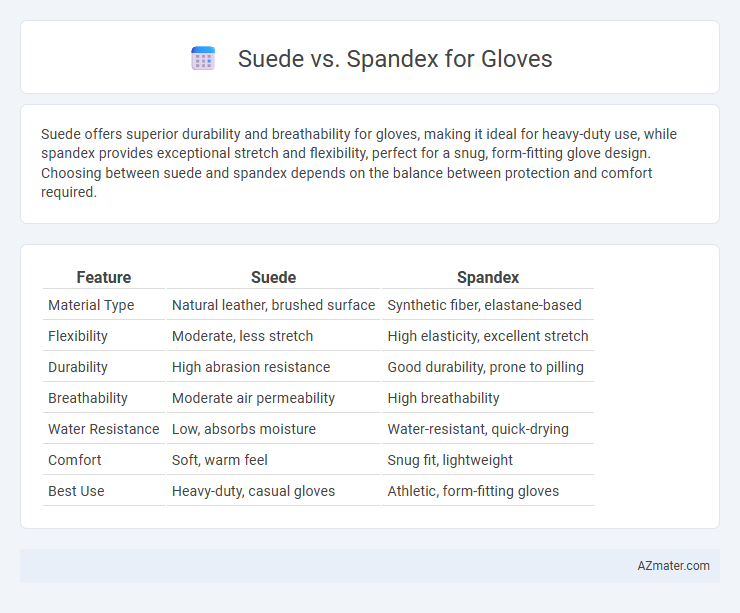Suede offers superior durability and breathability for gloves, making it ideal for heavy-duty use, while spandex provides exceptional stretch and flexibility, perfect for a snug, form-fitting glove design. Choosing between suede and spandex depends on the balance between protection and comfort required.
Table of Comparison
| Feature | Suede | Spandex |
|---|---|---|
| Material Type | Natural leather, brushed surface | Synthetic fiber, elastane-based |
| Flexibility | Moderate, less stretch | High elasticity, excellent stretch |
| Durability | High abrasion resistance | Good durability, prone to pilling |
| Breathability | Moderate air permeability | High breathability |
| Water Resistance | Low, absorbs moisture | Water-resistant, quick-drying |
| Comfort | Soft, warm feel | Snug fit, lightweight |
| Best Use | Heavy-duty, casual gloves | Athletic, form-fitting gloves |
Introduction: Suede vs Spandex Gloves
Suede gloves offer a soft, luxurious texture with excellent breathability and durability, making them ideal for cold weather and stylish wear. Spandex gloves provide superior stretchability and a snug fit, enhancing dexterity and comfort for activities requiring precise hand movements. Comparing suede and spandex gloves highlights the trade-off between durability and flexibility for different usage scenarios.
Material Overview: What is Suede?
Suede is a type of leather made from the underside of animal hides, primarily lamb, goat, calf, or deer, characterized by its soft, napped finish that offers a luxurious texture and good breathability. Unlike traditional leather, suede is flexible yet durable, making it an ideal material for gloves that require both comfort and grip. Its porous surface allows for better airflow, enhancing comfort during extended wear, though it is less water-resistant compared to synthetic materials like spandex.
Material Overview: What is Spandex?
Spandex is a synthetic fiber known for its exceptional elasticity, capable of stretching up to five times its original length while retaining its shape. It is commonly blended with other materials like cotton, nylon, or polyester to enhance flexibility and comfort in gloves. This fiber's lightweight, moisture-wicking, and durable properties make spandex ideal for gloves requiring a snug fit and superior dexterity.
Comfort and Fit Comparison
Suede gloves offer a soft, breathable texture ideal for comfort during extended wear, while spandex gloves provide superior elasticity that adapts closely to hand contours for a snug fit. The natural fibers in suede enhance moisture absorption and breathability, reducing sweat accumulation, whereas spandex's synthetic stretch ensures flexibility and prevents glove slippage. Combining these materials can optimize both comfort and fit, making gloves more durable and user-friendly for various activities.
Durability and Longevity
Suede gloves offer excellent durability due to their thick, natural grain leather that resists abrasion and maintains structural integrity under heavy use. Spandex gloves provide superior flexibility but tend to wear out faster, especially in high-stress areas, resulting in reduced longevity. For applications requiring extended glove life, suede remains the preferred material, offering a balance of toughness and comfort.
Grip and Functionality
Suede offers superior grip due to its textured surface, making it ideal for tasks requiring precision and control. Spandex excels in functionality by providing exceptional flexibility and a snug fit, enhancing dexterity and comfort during prolonged use. Combining suede palms with spandex backs ensures optimal grip and movement for versatile glove performance.
Breathability and Moisture Control
Suede gloves offer moderate breathability due to their natural leather fibers, but they tend to retain moisture, leading to reduced comfort during extended use. Spandex gloves excel in moisture control as their synthetic material wicks sweat away from the skin, promoting faster evaporation and improved airflow. When prioritizing breathability and moisture management, spandex gloves generally provide superior performance compared to suede options.
Style and Aesthetic Appeal
Suede gloves offer a luxurious, matte finish that conveys classic elegance and sophistication, making them ideal for formal or vintage-inspired looks. Spandex gloves, known for their sleek, shiny surface and body-hugging fit, provide a modern, sporty aesthetic that emphasizes agility and comfort. The choice between suede and spandex shapes the overall style, with suede delivering timeless warmth and texture while spandex highlights contemporary sleekness and flexibility.
Ideal Uses: When to Choose Suede or Spandex
Suede gloves offer excellent durability and grip, making them ideal for heavy-duty tasks like construction, gardening, and mechanical work where protection and abrasion resistance are crucial. Spandex gloves provide superior flexibility and breathability, perfect for activities requiring fine motor skills and comfort, such as cycling, running, or using touchscreen devices. Choosing suede is best for rugged environments demanding toughness, while spandex suits casual or precision tasks benefiting from stretch and lightweight feel.
Conclusion: Choosing the Right Glove Material
Suede gloves offer superior durability, breathability, and a natural grip ideal for heavy-duty tasks, while spandex gloves provide exceptional stretch, flexibility, and a close fit suitable for precision work and comfort. Selecting the right glove material depends on the specific use case, prioritizing either toughness and protection or elasticity and dexterity. For rigorous activities requiring resilience, suede is optimal; for tasks needing mobility and snugness, spandex delivers the best performance.

Infographic: Suede vs Spandex for Glove
 azmater.com
azmater.com